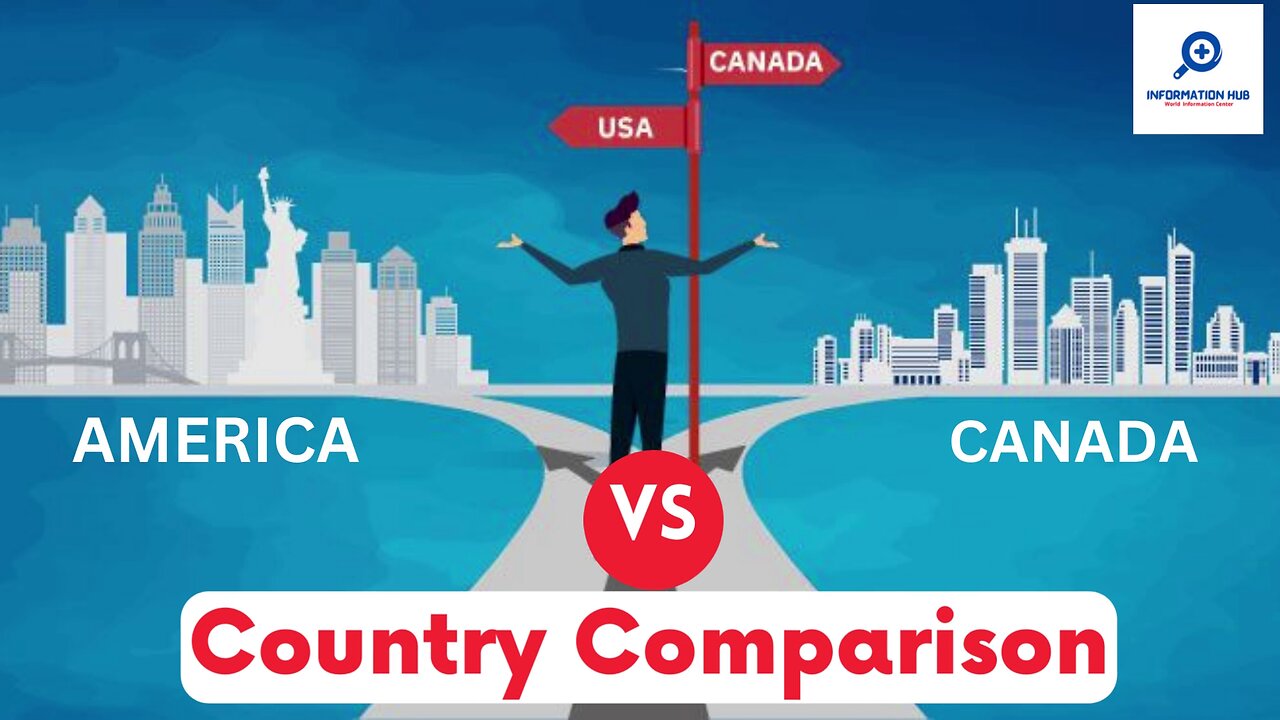Premium Only Content

America vs Canada - Countries Comparison 2023 ll Information Hub
USA vs Canada - Countries Comparison 2023
#usa #canada #information #countriescomparisonstats #countriescomparisonstats
Land Area, Government, Economy, Military, Gdp, Export, Import, Olympic Medals, National Animal, National Bird, Best Dishes, Largest Company, Productions, Tourism, Internet Users etc.....
Which Country do you Think is More Influential?
Share Your Views in the comment section down below.
Please review the contents. Your opinion matters Thank you for your support.
Subscribe for World informative Videos and press the bell icon
The United States of America (U.S.A. or USA), commonly known as the United States (U.S. or US) or America, is a country primarily located in North America. It consists of 50 states, a federal district, five major unincorporated territories, nine Minor Outlying Islands, and 326 Indian reservations. The United States is also in free association with three Pacific Island sovereign states: the Federated States of Micronesia, the Marshall Islands, and the Republic of Palau. It is the world's third-largest country by both land and total area. It shares land borders with Canada to its north and with Mexico to its south and has maritime borders with the Bahamas, Cuba, Russia, and other nations. With a population of over 333 million, it is the most populous country in the Americas and the third most populous in the world. The national capital of the United States is Washington, D.C. and its most populous city and principal financial center is New York City.
Paleo-Americans migrated from Siberia to the North American mainland at least 12,000 years ago, and are the ancestors of modern Native Americans. Great Britain's Thirteen Colonies quarreled with the British Crown over taxation and political representation, leading to the American Revolution (1765–1791). After the Revolution, the United States gained independence, the first nation-state founded on Enlightenment principles of liberal democracy.
In the late 18th century, the U.S. began expanding across North America, gradually obtaining new territories, sometimes through war, frequently displacing Native Americans, and admitting new states.
Canada is a country in North America. Its ten provinces and three territories extend from the Atlantic Ocean to the Pacific Ocean and northward into the Arctic Ocean, covering over 9.98 million square kilometres (3.85 million square miles), making it the world's second-largest country by total area. Its southern and western border with the United States, stretching 8,891 kilometres (5,525 mi), is the world's longest binational land border. Canada's capital is Ottawa, and its three largest metropolitan areas are Toronto, Montreal, and Vancouver.
Indigenous peoples have continuously inhabited what is now Canada for thousands of years. Beginning in the 16th century, British and French expeditions explored and later settled along the Atlantic coast. As a consequence of various armed conflicts, France ceded nearly all of its colonies in North America in 1763. In 1867, with the union of three British North American colonies through Confederation, Canada was formed as a federal dominion of four provinces. This began an accretion of provinces and territories and a process of increasing autonomy from the United Kingdom. This widening autonomy was highlighted by the Statute of Westminster, 1931, and culminated in the Canada Act 1982, which severed the vestiges of legal dependence on the Parliament of the United Kingdom.
Canada is a parliamentary democracy and a constitutional monarchy in the Westminster tradition. The country's head of government is the prime minister, who holds office by virtue of their ability to command the confidence of the elected House of Commons, and is appointed by the governor general, representing the monarch of Canada, the head of state. The country is a Commonwealth realm and is officially bilingual (English and French) at the federal level. It ranks among the highest in international measurements of government transparency, civil liberties, quality of life, economic freedom, education, gender equality and environmental sustainability. It is one of the world's most ethnically diverse and multicultural nations, the product of large-scale immigration. Canada's long and complex relationship with the United States has had a significant impact on its history, economy and culture.
-
 25:53
25:53
Stephen Gardner
11 hours ago🔥BREAKING: Trump HATING LAWYER busted in $17 million money laundering scheme!
48.5K131 -
 20:10
20:10
CartierFamily
18 hours agoAndrew Schulz DESTROYS Charlamagne’s WOKE Meltdown on DOGE & Elon Musk!
127K103 -
 33:56
33:56
The Why Files
9 days agoLegend of the 13 Crystal Skulls | From Mars to the Maya
86.8K43 -
 2:56:14
2:56:14
TimcastIRL
11 hours agoEPSTEIN Files DROP, FBI GOES ROGUE, AG Says They COVERED UP Epstein Case w/Amber Duke | Timcast IRL
221K132 -
 1:39:23
1:39:23
Kim Iversen
12 hours ago"Canada's Trump" Is Trudeau’s Worst Nightmare: Is Maxime Bernier the Future of Canada?
94.1K96 -
 DVR
DVR
Bannons War Room
10 days agoWarRoom Live
2.68M447 -
 16:06
16:06
The Rubin Report
18 hours agoProof the Islamist Threat in England Can No Longer Be Ignored | Winston Marshall
108K120 -
 2:07:07
2:07:07
Robert Gouveia
15 hours agoFBI Files Coverup! Bondi FURIOUS; SCOTUS Stops Judge; Special Counsel; FBI Does
140K97 -
 56:15
56:15
Candace Show Podcast
15 hours agoBREAKING: My FIRST Prison Phone Call With Harvey Weinstein | Candace Ep 153
187K118 -
 1:56:39
1:56:39
Flyover Conservatives
14 hours agoROBIN D. BULLOCK | Prophetic Warning: 2030 Is Up for Grabs – If We Don’t Act Now, Disaster Awaits! | FOC SHOW
69.8K20